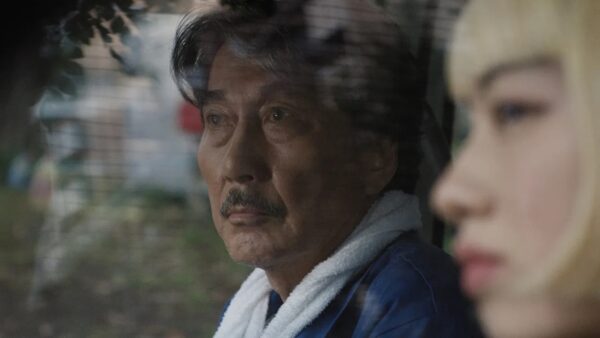By Peter Keough
In his latest feature, filmmaker Wim Wenders extols the simple life.
Perfect Days. Directed by Wim Wenders. Screening at the Alamo Seaport and AMC Boston Common and in the suburbs and at the Coolidge Corner Theatre.
Kōji Yakusho in a scene from Perfect Days.
The protagonists in some of Wim Wenders’s films tend to be literate types. Like Bruno Winter (Rüdiger Vogler) in Kings of the Road (1976) who periodically dips into William Faulkner’s 1939 novel The Wild Palms – that’s the one with the line “Between grief and nothing I will take grief.”
In Wenders’s new film Perfect Days, his blithest and most uplifting since Wings of Desire (1987), his hero Hirayama (Kōji Yakusho) is reading The Wild Palms as well, along with other books, including a collection of Patricia Highsmith’s short stories. Though separated by thousands of miles and five decades, this pair of Wenders’s characters have much in common besides their taste in literature. Both are solitary, like to listen to pop music, and pursue unusual professions. Winter repairs motion-picture projectors in down-and-out theaters in small towns on the then border between West and East Germany. Hirayama cleans public toilets in Tokyo — not ordinary toilets, mind you, but boutiquey ones designed by top architects. While the provincial movie houses of a divided Germany during the ’70s may have devolved into purveying shit, the shithouses of today’s Japan have been elevated into works of art. As such, they might be considered 21st century Japan’s progressive answer to decrepit, 20th century German grindhouses.
Like his German counterpart, Hirayama combines his more cerebral pursuits with a dedicated, meticulous, enthusiastic, ritualistic approach to his blue collar occupation. He awakes every morning at dawn, puts away his futon and bedding, brushes his teeth, trims his moustache, dons his “Tokyo Toilet” overalls, steps outside, looks up, and greets the new day with a grin. He buys a can of coffee from the vending machine outside his ramshackle building, climbs into his tiny van, pops in a cassette tape (his ’60s-’80s taste ranges from The Animals to The Kinks to Van Morrison, much like Wenders’s own) and drives off to work. The trip provides an offbeat tour of the city not unlike that in Wenders’s 1985 documentary Tokyo-ga, but four decades later.
As far as toilet cleaning goes, his duties are exceptionally pleasant. Each facility has a unique, whimsical design, ranging from glass-sided boxes which become opaquely colored when the door is closed to a rough-timbered structure that looks like it might have been designed by the subject of Wenders’s recent documentary Anselm.
Nor does he find the facilities particularly dirty. At worst, some cigarette butts or candy wrappers litter the floors but nothing gross — an omission for which the film has received some criticism. To be fair, Hirayama’s feckless co-worker Takashi complains about cleaning up puke on the morning shift, but the plumbing Hirayama encounters tends to be relatively pristine. And his lunch breaks are idyllic as well — taken in a park by his favorite tree where he will gaze at the sun passing through the drifting leaves and occasionally snap a picture or unearth a seedling to repot in his collection of Groot-like baby trees back home.
Those shadow-dappled leaves play a prominent part in the film — according to an endnote in Japanese they are called “komorebi” — tricks of the light epitomizing the ephemeral beauty of existence. They appear in Hirayama’s dreams that punctuate each of his days – kaleidoscopic, monochromatic collages of cryptic images designed by the director’s wife Dorota Wenders. Later Hirayama will play shadow tag with a stranger who is dying of cancer — the former husband of another passing shadow, the woman who runs the café where he sometimes drops by.
This game slyly demonstrates how people, as Hirayama has doubtlessly learned, are the supreme form of komorebi – transient, beguiling, ungraspable. People like teenage Niko (Arisa Nakano), Hirayama’s niece, whom he hasn’t seen in years. When she shows up unexpectedly at his doorstep, it inspires one of his few lines of dialogue, “My how you’ve grown!” She’s run away from home, having fought with her mother, Hirayama’s estranged sister Keiko (Yumi Asō). Here the film suggests a backstory not unlike one of the minimalist tragedies about ordinary families, the shoshimin eiga, produced by Wenders’s idol, director Yasujirô Ozu. Keiko comes to pick up the wayward Niko and, judging from her chauffeur-driven limo, there is no need for her to work cleaning toilets. She urges Hirayama to visit their father, who no longer remembers him. They part in tears.
For consolation, Hirayama plays Lou Reed’s “A Perfect Day,” a paean to quotidian pleasures and the antithesis of his “Heroin.” And, in the end, he listens to Nina Simone’s “Feeling Good,” a supremely joyful number from another sometimes grumpy performer. In an extended, enigmatic close-up Hirayama drives as he is transported by the music: his expressions suggest that he rejects nothing, embraces grief, and accepts everything.
Peter Keough writes about film and other topics and has contributed to numerous publications. He had been the film editor of the Boston Phoenix from 1989 to its demise in 2013 and has edited three books on film, most recently For Kids of All Ages: The National Society of Film Critics on Children’s Movies (Rowman & Littlefield, 2019).
artsfuse.org
https://artsfuse.org/287847/film-review-perfect-days-plumbing-the-depths/















